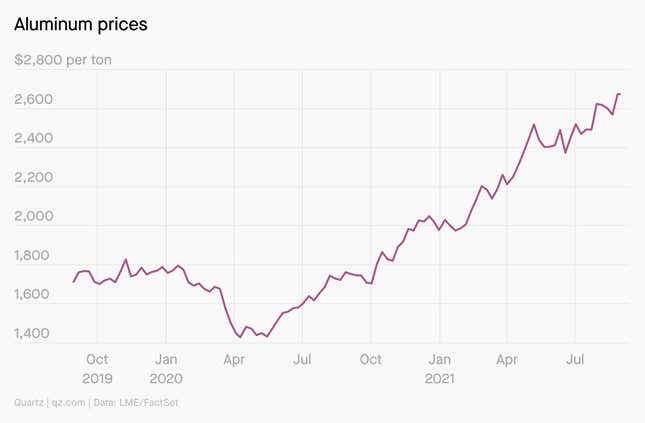Good morning, Quartz readers!
Was this newsletter forwarded to you? Sign up here. Forward to the friend who never gave up on Second Life.
Here’s what you need to know
The US has left Afghanistan. The final evacuation flight took off a minute before the midnight deadline, after military personnel disabled US Humvees and aircraft left at the airport. The US will not have a diplomatic presence in the country either. The Taliban fired celebratory shots in the air to proclaim “full independence.” Read more below.
China will no longer allow kids to play online video games on weekdays. The new regulations limit minors to 3 hours of gaming a week, and sent Chinese video game stocks tumbling. Meanwhile, slowing factory activity growth also weighed on Chinese stocks.
South Korea will break up Apple and Google’s app payment monopoly. The legislation, which is expected to be voted on today, will make the tech giants offer other forms of payment for their app stores, allowing app creators to bypass new commission charges.
New Orleans could be without power for weeks. Mayor LaToya Cantrell has urged evacuees to stay where they are as rescue teams sort through the destruction left by Hurricane Ida.
There are new cracks in the International Space Station. Discovered by Russian cosmonauts, the fissures are likely to get worse.
What to watch for

What’s next for Afghanistan? The Pentagon announced Monday evening that the last flight containing American soldiers had left Kabul, ending a 20-year war close to where it started: with the Taliban in control of the country. Afghanistan’s economy is highly dependent on foreign aid, which gives the international community some leverage over the regime. Among the areas of major concern are:
- The safety of Afghans who have collaborated with foreign troops and organizations, both those who wish to flee the country and those who will decide to stay after the Taliban’s promise of amnesty. The UN passed a resolution calling on the Taliban to honor a commitment to let people leave freely, but stopped short of calls for a “safe zone” in Kabul.
- The protection of women and girls, who fear a return to the violations of the first regime, including a ban on work and non-religious study, and widespread rape and kidnapping.
- The overall stability of the country, which could become grounds for a war between the Taliban and jihadist groups such as ISIS-K, further challenging local resistance to fundamentalism.
Skyrocketing aluminum prices and you
It might be time to go easy on your soda and foil consumption. Aluminum prices have hit their highest point in 10 years thanks to China’s crackdown on energy use, which directly affects smelters. Now, the world’s biggest aluminum producer and consumer has become an importer of the metal, with knock-on effects around the world.

“There’s just not enough metal in North America,” says Roy Harvey, CFO of US-based aluminum supplier Alcoa. Providers like Alcoa may be cheerfully riding the aluminum wave, but companies that use the element in their products—think beer cans and kitchen wraps—are looking at millions of dollars in increased costs. Consumers can expect to have the price passed along.
The future of dining out
To survive the pandemic, restaurants had to get creative. Now that they’ve created all this new infrastructure, diners should expect:
📱 A more seamless experience
🤔 Higher diner expectations
🌯 More options to get your food
🤑 Higher prices
🐕 More loyalty programs
🥡 A different physical layout of restaurants
To read all about the future of dining out in The Forecast, you’ll need to become a Quartz member. Subscribe today and get 40% off with code QZEMAIL40.
What we’re reading
🇨🇳 Beijing wants complete control over user data. It even has three new laws to get it.
📞 One drag on Nigeria’s GDP isn’t from Covid. The country couldn’t have picked a worse time to implement telecom regulations.
💪 US unions have more bargaining power because of the pandemic. But workers also have more leverage without unions.
🤖 US-China tensions are a risk factor. At least if you’re an AI company seeking capital while doing business in China.
😁 You might actually like meetings in VR. It depends on how much you like always smiling.
Surprising discoveries
Leaded gasoline is finally banned everywhere on Earth. It only took half a century.
Kenya partnered with TikTok for the wildebeest crossing. Africa is going all out to ramp up international tourism numbers.
A printing company makes business cards that smile. They show the lower half of the bearer’s face, sans mask.
There’s a new northernmost island. Located above Greenland, the icy islet’s formation likely has nothing to do with climate change.
The sun may eat us. Around 20-35% of similar stars ingest their planets.
Our best wishes for a productive day. Send any news, comments, unleaded gasoline, and uncharted isles to hi@qz.com. Get the most out of Quartz by downloading our iOS app and becoming a member. Today’s Daily Brief was brought to you by Tripti Lahiri, Annalisa Merelli, John Detrixhe, Liz Webber, and Susan Howson.
